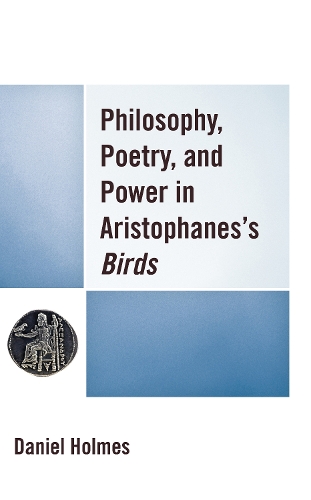
Philosophy, Poetry, and Power in Aristophanes's Birds
(Hardback)
Publishing Details
Philosophy, Poetry, and Power in Aristophanes's Birds
By (Author) Daniel Holmes
Bloomsbury Publishing PLC
Lexington Books
23rd November 2018
United States
Classifications
Professional and Scholarly
Non Fiction
Literary studies: ancient, classical and medieval
Literary studies: fiction, novelists and prose writers
Humour
Other performing arts
882.01
Physical Properties
Hardback
246
Width 160mm, Height 231mm, Spine 25mm
503g
Description
Aristophanes was clearly anxious about the role of the sophists and the new education in Athens. After the perceived failure of Clouds in 423 and its subsequent, unperformed revision, Aristophanes, this book argues, returned in 414 with Birds, a continuation and deepening of his critique found in Clouds. Peisetaerus or persuader of his comrades, the protagonist of Birds, though an old man, is clearly a student of Socrates phrontisterion. Unlike Socrates, however, he is political and ambitious and he understands the whole of human nature, both rational and irrational. Peisetaerus employs the various deconstructive techniques of Socrates and his allies (which is summed up on the comic sage in the image of father-beating) to overturn not just human society, but, with the help of his new allies, the divine and musical birds, the cosmos. After his new gods and bird city, Cloudcuckooland, are actually established, however, the hero re-introduces the old ways - justice, moderation, and obedience to law but now under his personal authority, and thereby becomes the highest of the gods. Thus, the author postulates, in 414 Aristophanes has come to acknowledge the potency of the apparent civic-minded turn (or element) of the sophists, while aware of the self-aggrandizing nature of their ambition. Peisetaerus, unlike Socrates, is successful: he is establishing a just polis and cosmos and, therefore, must be victorious. But the consequence or cost of this success is illustrated through the Bird Chorus. After the polis is founded, the birds never again sing of their musical reciprocity with the Muses, the source of melodies for men. The birds are now political and the policemen of human beings. The sophist-run cosmos has lost its music. The new Zeus is an ugly bird-mutant. The gods and all nomoi have lost their beauty, honor, and reverential nature. Birds, in its finale, hilariously, but boldly illuminates the inherent tension between philosophy (reason) and poetry (divinely-inspired tradition).
Reviews
In this impressive and original study of Aristophanes longest and most spectacular comedy, Daniel Holmes shows convincingly how the protagonist, adept in the rhetoric of the sophists, exercises persuasion to bring about a new society one that is functional but lacking in joy and beauty. Along the way, Holmes offers illuminating insights into the sophist movement, utopian theories, and popular attitudes toward politics in classical Athens. -- David Konstan, New York University
Author Bio
Daniel Holmes is associate professor of classics at Sewanee: The University of the South.
